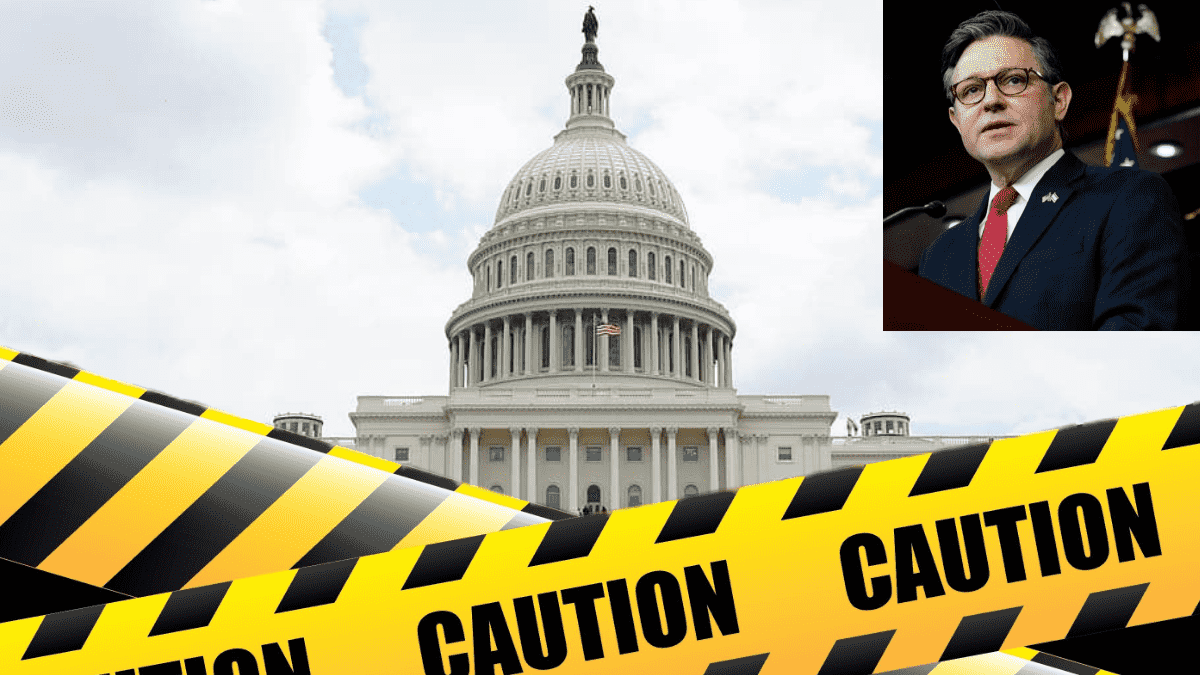The House of Representatives narrowly averted a government shutdown on Friday by passing a massive $1.2 trillion spending package. This crucial legislation funds essential government operations through September, but it came at a cost for House Speaker Mike Johnson.
Government Shutdown Averted Key Points:
Shutdown Averted: The House passed the spending bill in a tense 286-134 vote, with significant support from Democrats. This ensures most federal agencies will remain operational until the end of the fiscal year.
House Divided: Despite the bill’s passage, deep fissures remain within the Republican party. Many conservatives opposed the package, viewing it as insufficient spending cuts. This discontent led to Rep. Marjorie Taylor Greene filing a motion to oust Speaker Johnson.
A Package of Compromises: The spending bill includes wins for both parties. Democrats secured increased funding for childcare and healthcare, while Republicans obtained a boost for border security and defense spending.
Senate on Deck: The Senate now needs to act quickly to pass the bill before the midnight deadline to avoid a shutdown. However, disagreements over amendments within the Senate could delay this process.
Key Players:
House Speaker Mike Johnson: His decision to bring the bill forward, requiring Democratic support, strained relations within the Republican party. He now faces potential removal attempts.
Rep. Marjorie Taylor Greene’s motion to remove Speaker Johnson highlights the deep divisions within the House GOP caucus.
What’s in the Bill?
The spending bill also includes other provisions, such as:
- A $48.6 billion increase in discretionary funding for the National Institutes of Health (NIH), representing an increase of $300 million in base funding over fiscal year 2023. This includes a $75 million increase for mental health research, a $100 million increase for Alzheimer’s disease research, a $120 million increase for cancer research, and a $5 million increase for opioid research.
- $4.6 billion for substance use prevention and treatment. The bill provides $1.5 billion for state opioid response grants, and $145 million for the Rural Communities Opioid Response Program.
- $4 billion for the Low Income Home Energy Assistance Program (LIHEAP), representing a $25 million increase, aimed at helping low-income households heat and cool their homes.
- Gives service members a 5.2% pay raise.
- $1.18 billion for the Small Business Administration (SBA), including $316.8 million for entrepreneurial development grants.
- $300 million in funding for Ukraine Security Assistance Initiative.
- $792 million, an increase of $57 million, for the U.S. Capitol Police recruiting and retention efforts.
Breakdown of Key Provisions:
- Defense Boost: The bill provides a significant increase in military funding, a win for Republicans who prioritize national security.
- Early Childhood Education: Democrats celebrate a $1 billion increase for childcare and early learning programs, including a boost for Head Start.
- Border Security: Republicans gain additional funding for border security measures, including an increase in ICE detention beds and border agents.
- UN Aid Controversy: The bill includes a provision halting funding for the UN agency assisting Palestinian refugees (UNRWA) until March 2025, raising concerns from some Democrats.
- Pay Raise for Service Members: Military personnel receive a 5.2% pay raise in the package.
- Aid for Ukraine: The bill allocates $300 million in funding to support Ukraine.
Speaker Johnson’s Challenges
Looking Ahead:
As the Senate takes the reins in preventing a potential government shutdown, the onus is on its members to engage in thorough deliberations and compromise. While the House has managed to forge a bipartisan path with the passing of the spending bill, the Senate’s responsibility lies in addressing any proposed amendments and finding common ground among its members.
The forthcoming days will serve as a critical juncture in determining the fate of this spending package and whether it garners the necessary support to stave off a government shutdown. It is imperative for Senate leaders to navigate these negotiations skillfully to ensure a timely resolution and maintain the functioning of essential government operations.
FAQs – Government Shutdown Averted
- What was the outcome of the recent House of Representatives vote regarding government shutdown?
The House narrowly avoided a government shutdown by passing a $1.2 trillion spending package in a tense 286-134 vote. This ensures federal agencies’ operations until the end of the fiscal year.
- What internal dynamics within the Republican party were revealed by the passing of the spending bill?
Despite the bill’s passage, deep divisions persist within the Republican party. Many conservatives opposed the package, leading to discontent and a motion filed by Rep. Marjorie Taylor Greene to oust Speaker Johnson.
- What are some key provisions of the spending bill?
The spending bill includes significant funding increases for various programs, such as healthcare research, substance abuse prevention, low-income home energy assistance, Small Business Administration, and support for Ukraine.
- Who are the key players involved in the aftermath of the spending bill’s passing?
House Speaker Mike Johnson faces potential removal attempts following his decision to rely on Democratic support for the bill’s passage. Rep. Marjorie Taylor Greene’s motion to remove him highlights the internal divisions within the House GOP caucus.
- What are the next steps in preventing a government shutdown?
The Senate must act quickly to pass the bill before the midnight deadline. However, disagreements over amendments within the Senate could potentially delay this process.
- What challenges does Speaker Johnson currently face?
Speaker Johnson finds himself in a precarious position due to discontent within the Republican party over his reliance on Democratic support. The motion to remove him from his position underscores the deep-seated divisions within the House GOP caucus.
- What should we expect regarding government funding and potential shutdown in the upcoming days?
The Senate’s actions will be crucial in preventing a government shutdown. The coming days will determine whether the spending package is approved, and discussions regarding funding for Ukraine may further intensify internal disagreements.
Read More >>https://trenditweetz.com/fani-willis-donald-trump-legal-battle/






